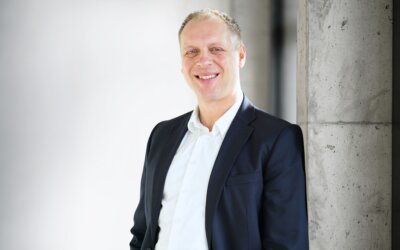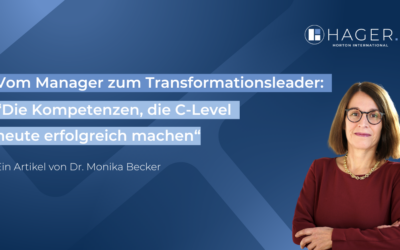Will the switch to renewable energies make the industry more female or more diverse?
Ulf Gissel, expert in the field of energy at HAGER Executive Consulting, which specializes in executive search, in an interview with Natascha Zeljko, F10.

You have been working in the energy sector for a long time. Sounds like a rather dry subject, at least that was the case until a few years ago. What attracted you to this topic?
My first contact with renewable energies was in the field of water management. I really immersed myself in the subject when I moved to HR consulting in 2018. By then at the latest, I had penetrated the topic in all its complexity. It’s not just about energy generation, but also about energy trading, distribution, sales and even the energy services business. There are many innovative companies with interesting business models, particularly in the field of renewable energies, which are setting the course for the energy system of the future. Since then, I have become passionate about this segment. I am committed to accelerating the energy transition by bringing together those people in the industry who belong together.
Were you surprised at how polarized the topic of renewable energies still is?
No, that didn’t surprise me. After all, it was one of the big election issues. And it’s always a controversial topic at regional level, the best example being wind turbines. There are emotional debates between supporters and critics who complain that wind turbines spoil the landscape. In my view, education is needed here. You have to convince people of the benefits and create acceptance. What I have heard from the trade fairs is that the entire industry is calling for a bold commitment from the new government. In the last legislative period, great goals were set, with a rather sobering implementation. In my view, the industry is ready to tackle the challenges and achieve the consistent expansion of renewables.
Real change always requires a changed mindset and plurality. However, the energy sector in particular is still not very diverse.
Yes, that’s true. The conventional energy sector is still old, white and male, to put it in a nutshell. This is not just a prejudice, but a reality in many German companies, and not just in the energy sector. Only around 16 percent of all companies in Germany are managed by women, while the proportion of women on DAX management boards is 17.8 percent. So there is still a need for action. There are very few women in the energy industry, especially in the technical sector. Even companies that proactively try to promote women and bring them into management positions are faced with the challenge that there is hardly any choice. This is certainly also due to the general conditions. Many companies, for example, cannot imagine a manager working part-time. Other industries are already further ahead in this respect and have shown what is possible.
To what extent are changes recognizable in the newer companies – also in terms of a higher proportion of female employees?
You can already see a certain change and openness among companies in the renewable energy sector. Nevertheless, the problem remains that there are still too few women specialists in the field. That’s why I’m particularly pleased that great initiatives are emerging here. I have been supporting w.one, which stands for “Women of New Energy”, since 2019. This is an ambitious network that connects women in the renewable energy sector. It offers formats for professional impetus and personal development, for example in the form of mentoring programs for career starters and women in management positions. What I like about the network is the open and appreciative approach – but above all the courage to implement the topics. In my view, we would benefit enormously if we had more diversity here. Women and men are not competitors, but cooperation partners on this exciting journey, always with the aim of working together to achieve equal opportunities. Men in particular need to learn this.
How does that work?
By taking them to events like this, for example. The first time I was a guest, there were around 60 women in the room. There were also a few men there, but I was the only one on stage. And then you quickly realize that it doesn’t really matter if you have a common theme, a common mission. Many people have never had an experience like this before and you have to bring it closer to them. I want to make sure that at some point it is no longer an issue. Companies, on the other hand, should promote women more and credibly convey to them that they can also progress in their careers. They can’t just wait until someone applies or a woman approaches them, they have to take a proactive approach. Conversely, the same applies to women. They should be more self-confident and demand more. Closing this gender gap is crucial because women are the driving force behind innovative, interactive or integrative solutions, especially in renewable energies. For the energy transition to succeed, we need greater participation from a diverse talent pool. One ray of hope in this respect is the younger generation. They deal with these issues very differently. This is where companies need to start: It is not individual character but performance that should determine career opportunities.
Let’s talk about technologies. What do you think are the most important drivers at the moment?
We live in exciting times! Knowledge is growing exponentially thanks to artificial intelligence, machine learning and IoT. If you look at human history, a lot has changed in a very short space of time and everything that was thought to be certain has been turned upside down. One example: 2019 was the first year in which energy demand rose while fossil fuel-based electricity generation fell. It was the first year in which nuclear energy and renewables together generated as much electricity worldwide as coal-fired power plants. There is a lot going on and there are very interesting trends. For example, the expansion of emission-free hydrogen and ammonia as alternatives to electrification. In terms of electrification, this is one of the biggest innovations in combination with sector coupling for a flexible energy system. Integrated power-heat concepts for industry or the conversion of wind and solar into hydrogen or methane, i.e. power-to-gas or power-to-liquids. And finally, increasing energy efficiency and reducing energy demand is also an important point. This means that each and every individual can play a part. If you think about how much electricity is used for nonsense, you can make massive savings.
What does all this mean for recruiting? What are the exciting jobs that are currently emerging in the industry? What skills are in demand?
I wouldn’t go into specific profiles at all, it’s constantly changing. In my view, this is much more important than any job title: We need to make potential measurable instead of just looking purely at experience and recruiting based on that. That’s why social skills are more important than ever. We should start with children at school and not turn them into competitors or machines. The machine will always have the faster computing power. You lose the race. Instead, we should strengthen children in terms of teamwork, empathy, creativity – basically in everything that has significantly advanced us in our human development. That’s why social skills will be the most important factor in the coming years, regardless of the specific position or hierarchical level. Apart from that, there are many exciting topics ahead of us. What will the workplace of tomorrow look like? Keyword meta: will we slip into our avatar in the morning, use it to go shopping and then go to the office digitally? We will be faced with issues that we have never had to deal with before and that we will have to address.


